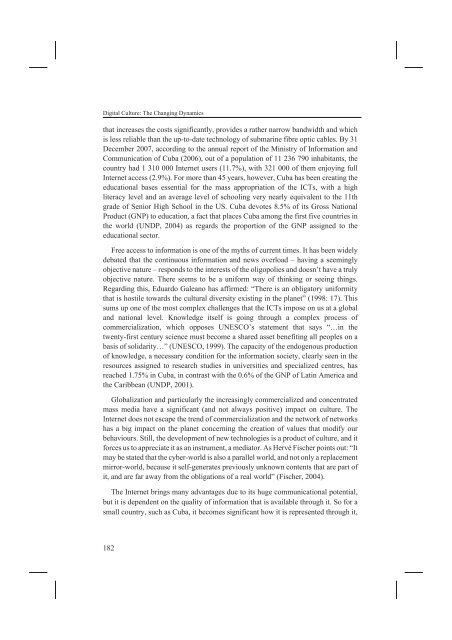D:\Documents and Settings\Ana\My Documents\Biserka-knjiga ...
D:\Documents and Settings\Ana\My Documents\Biserka-knjiga ...
D:\Documents and Settings\Ana\My Documents\Biserka-knjiga ...
You also want an ePaper? Increase the reach of your titles
YUMPU automatically turns print PDFs into web optimized ePapers that Google loves.
Digital Culture: The Changing Dynamics<br />
that increases the costs significantly, provides a rather narrow b<strong>and</strong>width <strong>and</strong> which<br />
is less reliable than the up-to-date technology of submarine fibre optic cables. By 31<br />
December 2007, according to the annual report of the Ministry of Information <strong>and</strong><br />
Communication of Cuba (2006), out of a population of 11 236 790 inhabitants, the<br />
country had 1 310 000 Internet users (11.7%), with 321 000 of them enjoying full<br />
Internet access (2.9%). For more than 45 years, however, Cuba has been creating the<br />
educational bases essential for the mass appropriation of the ICTs, with a high<br />
literacy level <strong>and</strong> an average level of schooling very nearly equivalent to the 11th<br />
grade of Senior High School in the US. Cuba devotes 8.5% of its Gross National<br />
Product (GNP) to education, a fact that places Cuba among the first five countries in<br />
the world (UNDP, 2004) as regards the proportion of the GNP assigned to the<br />
educational sector.<br />
Free access to information is one of the myths of current times. It has been widely<br />
debated that the continuous information <strong>and</strong> news overload – having a seemingly<br />
objective nature – responds to the interests of the oligopolies <strong>and</strong> doesn’t have a truly<br />
objective nature. There seems to be a uniform way of thinking or seeing things.<br />
Regarding this, Eduardo Galeano has affirmed: “There is an obligatory uniformity<br />
that is hostile towards the cultural diversity existing in the planet” (1998: 17). This<br />
sums up one of the most complex challenges that the ICTs impose on us at a global<br />
<strong>and</strong> national level. Knowledge itself is going through a complex process of<br />
commercialization, which opposes UNESCO’s statement that says “…in the<br />
twenty-first century science must become a shared asset benefiting all peoples on a<br />
basis of solidarity…” (UNESCO, 1999). The capacity of the endogenous production<br />
of knowledge, a necessary condition for the information society, clearly seen in the<br />
resources assigned to research studies in universities <strong>and</strong> specialized centres, has<br />
reached 1.75% in Cuba, in contrast with the 0.6% of the GNP of Latin America <strong>and</strong><br />
the Caribbean (UNDP, 2001).<br />
Globalization <strong>and</strong> particularly the increasingly commercialized <strong>and</strong> concentrated<br />
mass media have a significant (<strong>and</strong> not always positive) impact on culture. The<br />
Internet does not escape the trend of commercialization <strong>and</strong> the network of networks<br />
has a big impact on the planet concerning the creation of values that modify our<br />
behaviours. Still, the development of new technologies is a product of culture, <strong>and</strong> it<br />
forces us to appreciate it as an instrument, a mediator. As Hervé Fischer points out: “It<br />
may be stated that the cyber-world is also a parallel world, <strong>and</strong> not only a replacement<br />
mirror-world, because it self-generates previously unknown contents that are part of<br />
it, <strong>and</strong> are far away from the obligations of a real world” (Fischer, 2004).<br />
The Internet brings many advantages due to its huge communicational potential,<br />
but it is dependent on the quality of information that is available through it. So for a<br />
small country, such as Cuba, it becomes significant how it is represented through it,<br />
182



